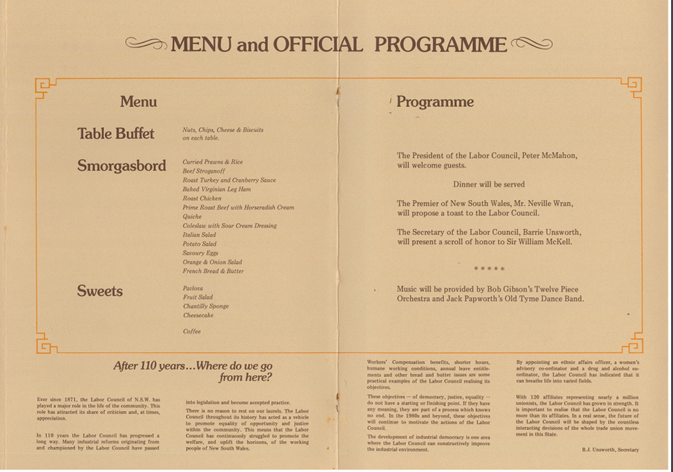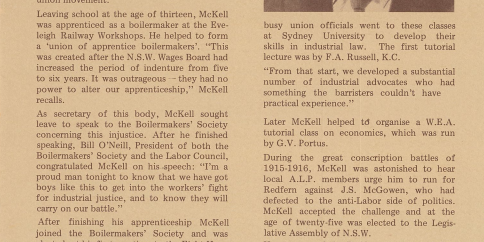Published as an insert in the booklet produced for the 110th celebrations of the Labor Council of NSW, J.D. Moore Pty Ltd, Sydney.
On January 1st 1901, William McKell, a nine-year-old schoolboy, watched a fascinating procession walking towards the Sydney Town Hall.
Among the procession were miners and unionists from as far away as Broken Hill. Like the others, they were celebrating Australia’s day of nationhood.
To McKell it seemed amazing that the trade unions were featured so prominently. It symbolised the fact that ordinary people were part of the great expectations of the times: “From that day I wanted to be part of the union movement.”
Leaving school at the age of thirteen, McKell was apprenticed as a boilermaker at the Eveleigh Railway Workshops. He helped to form a ‘union of apprentice boilermakers’. “This was created after the NSW Wages Board had increased the period of indenture from five to six years. It was outrageous – they had no power to alter our apprenticeship,” McKell recalls.
As secretary of this body, McKell sought leave to speak to the Boilermakers’ Society concerning this injustice. After he finished speaking, Bill O’Neill, President of both the Boilermakers’ Society and the Labor Council, congratulated McKell on his speech: “I’m a proud man tonight to know that we have got boys like this to get into the workers’ fight for industrial justice, and to know they will carry on our battle.”
After finishing his apprenticeship, McKell joined the Boilermakers’ Society and was elected, at his first meeting, to the Eight Hour Day Committee and to represent the union at a National Eight Hour Day Conference in Melbourne. Soon afterwards, in 1912, he was attending meetings of the Labor Council of NSW.
In 1913, McKell was a member of a Labor Council committee which established the Workers’ Educational Association. As Assistant Secretary of the Boilermakers’ Society, McKell felt that unions were at a distinct disadvantage in arguing a case before the industrial tribunals. “The job of advocacy usually fell to the secretary of the union, pitted against a barrister for the employers. On industrial law matters we were often beaten on points of interpretation,” McKell says.
McKell organised a WEA tutorial class in industrial law. One afternoon each week, busy union officials went to these classes at Sydney University to develop their skills in industrial law. The first tutorial lecture was by F.A. Russell, K.C.: “From that start, we developed a substantial number of industrial advocates who had something the barristers couldn’t have – practical experience.”
Later McKell helped to organise a WEA tutorial class on economics, which was run by G.V. Portus.
During the great conscription battles of 1916-1917, McKell was astonished to hear local ALP members urge him to run for Redfern against J.S. McGowen, who had defected to the anti-Labor side of politics. McKell accepted the challenge and in 1917 at the age of twenty-five was elected to the Legislative Assembly of NSW.
He represented the Redfern area up to 1947, when he was appointed Governor-General of Australia.
Looking back over those years, McKell says: “Redfern has been a major and happy part of my life. This is the area that elected me to be its representative in Parliament for thirty years, and these are the people I have known and loved, for a lifetime.”
Once in Parliament, McKell spoke eloquently of the injustices that afflicted his family, friends and fellow workers. He recalls: “As a young man, working to support my mother, our landlord called one day with the news that our rent had been doubled. This new rent would have been a struggle to pay. He made no complaint whatever about our tenancy, and we had been good tenants for many years, but without any explanation whatever, he served us with a notice to quit.
“This required us to vacate the house within seven days, and failure to do so meant the whole of our belongings would have been deposited on the footpath. Under the law at that time, he was acting within his legal rights. This arbitrary conduct emphasised in my mind the grave injustice of the law and the necessity for its alteration.” When McKell became Minister for Justice in the Storey government, he amended the law to give tenants security of tenancy, thereby preventing legal sanction for this inhuman behaviour.
McKell was a member of the Lang governments of the late 1920s and early 1930s. His views on these years are summarised in his biography by Vince Kelly, Man of the People.
In 1939 he was elected leader of the demoralised Labor Party, defeated at every poll since Governor Game dismissed the Lang government in 1932. The ALP was tormented and split by the personalities and issues that seemed greater than it could handle. Within two years McKell was Premier.
Almost alone among his colleagues, McKell had a vision of changing society. His length of service in the ALP and the union movement, ministerial experience and contacts throughout the State placed him in an ideal position to revitalise the ALP.
From 1941 to 1947 – the McKell years – NSW was governed in an industrially progressive spirit.
McKell initiated the formation of a Factory Welfare Board, introduced a miners’ pension, formed the Government Insurance Office, amended the Workers Compensation Act to extend coverage to workers injured going to or from work, established the Newcastle State Dockyard, created the Housing Commission of NSW, passed an Act providing holidays on full pay for all workers – the first legislation of its type in NSW. “There were two major aims of my government: firstly, the preservation of the nation – initiating conservation measures and improving food production. Secondly, the provision of decent working and living conditions for the mass of the people.”
Throughout this period McKell enjoyed good relations with the Labor Council of NSW. “Our association was the happiest I can remember of any Labor government. They never saw me on delegations demanding this or that, the relationship was entirely different. But of course, I always wanted to be one jump ahead.”
McKell’s style of leadership – non-abrasive, constructively critical, radically reformist – has been emulated by NSW Labor politicans ever since.
In 1947, Chifley requested McKell take up the position of Governor General, which he held until 1953. In the last 34 years, Sir William McKell (who was knighted while Governor General) has lived in retirement. His achievements, however, have not been forgotten.
The Labor Council of NSW has a lot to thank him for.












